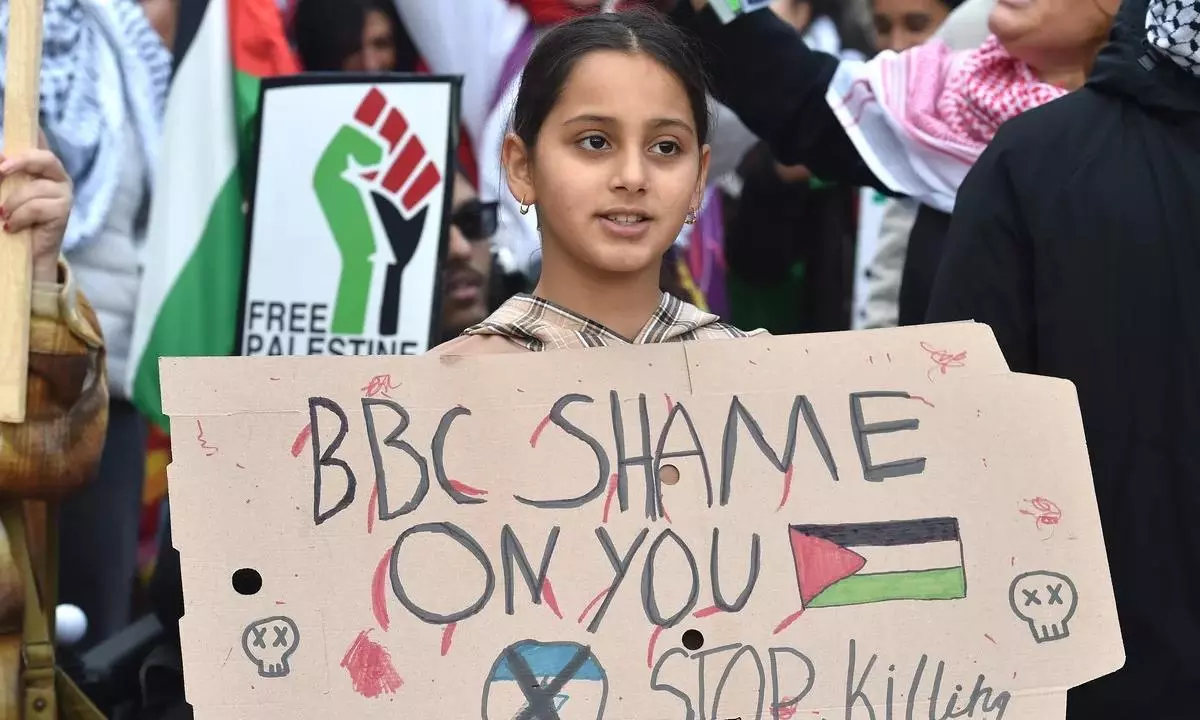
Over 100 BBC staff claim BBC coverage dehumanises Palestinians amidst Gaza war
text_fieldsMore than 100 BBC staff members, joined by over 200 media industry professionals, historians, academics, actors, and politicians, have alleged that the BBC’s coverage of the ongoing Israel-Gaza conflict exhibits a pro-Israel bias.
A letter addressed to the BBC’s Director General Tim Davie and CEO Deborah Turness criticizes the broadcaster for lacking adherence to “evidence-based journalism” and for failing to challenge Israeli narratives, Al Jazeera reported.
The letter, first reported by The Independent, accuses the BBC of inadequately scrutinising Israeli actions in Gaza. Signatories argue that the broadcaster’s reporting on the conflict has systematically dehumanised Palestinians by not providing sufficient context, balance, or accountability.
They emphasize that the BBC’s purported shortcomings in coverage have significant consequences, as each report, article, or interview can shape public perception of the conflict. This alleged imbalance, they contend, stands in contrast to the BBC’s critical stance on other international conflicts, notably its coverage of alleged Russian war crimes in Ukraine.
The war in Gaza, which began after a Hamas-led attack on Israel on October 7, 2023, has resulted in extensive casualties. According to recent reports, at least 43,259 Palestinians have died, with an additional 101,827 injured. Israel has also extended its military actions to Lebanon, where close to 2,900 people have been killed and over 13,000 wounded. Within Israel, 1,139 people lost their lives in the initial Hamas attacks, and over 200 individuals remain captive.
The letter to the BBC leadership outlines several recommended changes to ensure balanced reporting. The signatories urge the BBC to reiterate that Israel restricts external journalist access to Gaza, to clearly indicate instances when evidence supporting Israeli claims is insufficient, and to identify Israel as the primary aggressor in headlines where applicable. They also advocate for the inclusion of historical context beyond the immediate conflict timeline and for more rigorous questioning of Israeli officials in interviews.
The signatories argue that as a publicly funded organisation with high levels of public trust, the BBC has a duty to pursue factual reporting fearlessly. They suggest that failure to meet this responsibility risks the broadcaster’s impartiality and independence, core tenets of its licence fee-supported model.
The letter also points to perceived “double standards” in the BBC’s reporting on civilian casualties across different conflicts, noting a disparity in the way Palestinian and Israeli lives are portrayed.
The criticism follows previous allegations against the BBC for perceived biases in its conflict reporting. In a separate letter last year, eight UK-based BBC journalists claimed that the broadcaster exhibited a double standard by showing an “unflinching” approach to alleged Russian war crimes in Ukraine while remaining lenient in its reporting on Israel’s actions.
In response, the BBC has defended its journalistic approach, acknowledging restrictions on reporting access in Gaza and certain areas of Lebanon. The broadcaster maintains that it remains committed to transparency, regularly informing its audience of any errors or updates in coverage, and working to secure access to the regions under conflict to deliver comprehensive reporting.

















